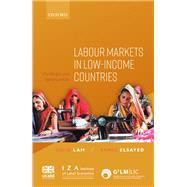- ISBN: 9780192897107 | 0192897101
- Cover: Hardcover
- Copyright: 3/9/2022
Labour Markets in Low-Income Countries addresses some of the most important issues affecting labour markets in low-income countries. It builds heavily on the new research evidence that has been provided by the programme on Growth and Labour Markets in Low-Income Countries (GLM|LIC), which was created as a partnership between UK Department for International Development (now part of the Foreign, Commonwealth, and Development Office) and the German IZA- Institute of Labor Economics in 2011. The programme has contributed to the growing interest in understanding labour markets in the poorest countries by producing high-quality research outputs and policy documents, as well as through interactions with various stakeholders and impacts on programs and policies.
Across nine chapters dealing with different aspects of labour markets in developing countries, David Lam and Ahmed Elsayed provide lessons about what kinds of labour market programmes and policies can make a difference. Some of these lessons are about the difficulties that many well-intentioned programmes face when they are implemented. Vocational training programmes, for example, one of the most widely implemented labour market interventions, have a disappointing record when subjected to rigorous evaluation. Public Works programmes have also had mixed results when rigorously evaluated. Other lessons are more positive, however. Some of the modifications and additions to traditional programmes that have been tested recently in different projects have had encouraging results. The book provides evidence of what works and what doesn't in areas such as skills training, worker-firm matching, rural labour markets, migration, youth unemployment, and women's empowerment.
This is an open access title available under the terms of a CC BY-NC-ND 4.0 International licence. It is free to read at Oxford Scholarship Online and offered as a free PDF download from OUP and selected open access locations.
Across nine chapters dealing with different aspects of labour markets in developing countries, David Lam and Ahmed Elsayed provide lessons about what kinds of labour market programmes and policies can make a difference. Some of these lessons are about the difficulties that many well-intentioned programmes face when they are implemented. Vocational training programmes, for example, one of the most widely implemented labour market interventions, have a disappointing record when subjected to rigorous evaluation. Public Works programmes have also had mixed results when rigorously evaluated. Other lessons are more positive, however. Some of the modifications and additions to traditional programmes that have been tested recently in different projects have had encouraging results. The book provides evidence of what works and what doesn't in areas such as skills training, worker-firm matching, rural labour markets, migration, youth unemployment, and women's empowerment.
This is an open access title available under the terms of a CC BY-NC-ND 4.0 International licence. It is free to read at Oxford Scholarship Online and offered as a free PDF download from OUP and selected open access locations.







